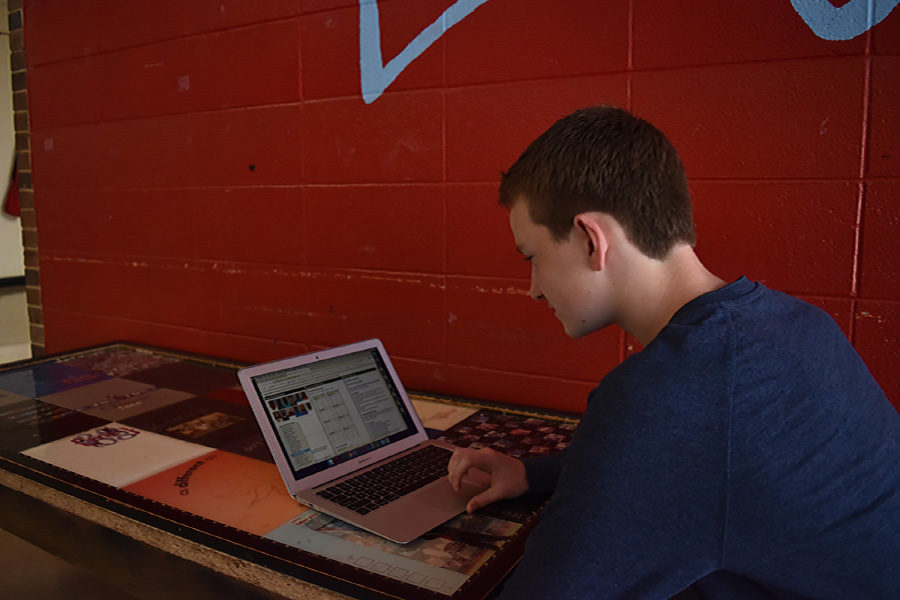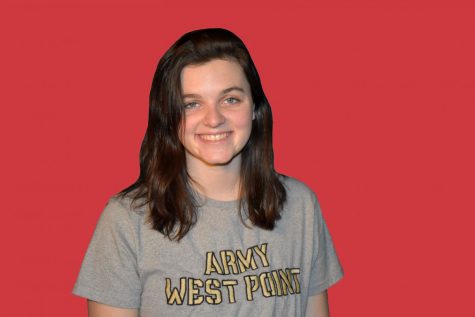Whether it’s making brackets, dressing in team jerseys, placing bets or attending games and matches, sports fans support their teams in a variety of ways. For some, the love of the sport goes beyond the game. Freshman Connor Gusky combined his passion for sports and math by starting the school’s very first Sports Analytics Club.
“I like school, and I love sports, so I realized that the perfect combination of that is sports analytics,” Gusky said. “I didn’t have any experience with it before, but I figured it out along the way. I talked to the AP Statistics teacher, [Chris] Johnson, and he helped me out and spoke at some of our meetings. I pieced it together by reading a lot of websites, and I even bought a textbook.”
Gusky and his fellow members are still learning the ropes of sports analytics and are not as advanced as professionals, but they are eager to learn.
“My friends and I aren’t that advanced. We recently looked at the SuperBowl, and, looking at a list of the last 20 years, we found which team had the best statistics in total offensive yards. We found that for both the Patriots and the Rams, and we were able to tell who would win,” Gusky said. “It turned out we were wrong, but you can’t win them all. There is definitely a lot of error–math isn’t everything–but we did some calculations with March Madness, and I ended up winning the whole bracket, so it definitely does work a lot of the time.”
Not only has sports analytics given members a greater understanding of the game, but it has also changed the way they watch games both at the stadium or on TV.
“It makes me think about the next level of the game,” freshman Ben Key said. “[Sports analytics] show how sometimes players do things that don’t seem smart, but it’s actually productive to the game.”
Freshman Mason Paul agrees that sports analytics changes the way he watches games and matches, but it also changed his appreciation for the coaches.
“We learned how sports analytics can affect coach decisions and the results of the game,” Paul said. “If a coach looks at a certain player who has only a few amount of yards run throughout the season, the coach will be less likely to play them. It’s an interesting mix of math and sports.”
Thanks to his experience of starting the club, Gusky is considering pursuing sports analytics as a career.
“Every sport is so different in its own way so you’re going to have a huge variety of types of statistics. It would be really interesting to do this as a career,” Gusky said. “It’s exploded at a lot of colleges–Stanford, Washington University–a lot of the top schools are starting sports analytics clubs of their own. Right now it’s a hobby; I get to hang out with my friends and do stuff that I enjoy. I’ve enjoyed the people, the actual math of it, and the combination of it all.”




![Smiling in a sea of Longhorns, Fox 2 reporter Ty Hawkins joins junior Darren Young during the morning Oct. 3 pep rally. The last time West was featured in this segment was 2011. “[I hope people see this and think] if you come to [Parkway] West, you will have the time of your life because there are so many fun activities to do that make it feel like you belong here. I was surprised so many people attended, but it was a lot of fun,” Young said.](https://pwestpathfinder.com/wp-content/uploads/2025/10/Edited2-1200x798.jpg)
![West High seniors and families listen as a representative of The Scholarship Foundation of St. Louis, Teresa Steinkamp, leads a Free Application for Federal Student Aid (FAFSA) workshop. This session, held in the library, provided guidance on financial aid, scholarships and student loan options. “This event is very beneficial for any seniors who are applying to or considering applying to colleges after high school [because] the cost of college is on the rise for seniors and parents,” college and career counselor Chris Lorenz said.](https://pwestpathfinder.com/wp-content/uploads/2025/09/DSC_4478-1200x778.jpg)
![Senior Kamori Berry walks across the field during halftime at the Homecoming football game on Sept. 12. During the pep assembly earlier that day, she was pronounced Homecoming Queen. “I thought it was nice that the crowd [started] cheering right away. I know [my friends] were really excited for me, and my family was happy because typically non-white people don't win,” Berry said.](https://pwestpathfinder.com/wp-content/uploads/2025/09/DSC7046-Enhanced-NR-1200x798.jpg)



![Pitching the ball on Apr. 14, senior Henry Wild and his team play against Belleville East. Wild was named scholar athlete of the year by St. Louis Post-Dispatch after maintaining a high cumulative GPA and staying involved with athletics for all of high school. “It’s an amazing honor. I feel very blessed to have the opportunity to represent my school [and] what [it] stands for,” Wild said.](https://pwestpathfinder.com/wp-content/uploads/2025/05/unnamed-6-1200x714.jpg)
![The Glory of Missouri award recipients stand with their certificates after finding out which virtue they were chosen to represent. When discovering their virtues, some recipients were met with contented confirmation, while others, complete surprise. “I was not at all surprised to get Truth. I discussed that with some of the other people who were getting the awards as well, and that came up as something I might get. Being in journalism, [Fellowship of Christian Athletes and] Speech and Debate, there's a culture of really caring about truth as a principle that I've tried to contribute to as well. I was very glad; [Truth] was a great one to get,” senior Will Gonsior said.](https://pwestpathfinder.com/wp-content/uploads/2025/04/Group-Glory-of-Missouri.jpg)

